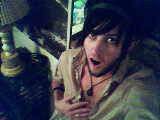the critics say that epics have died out
with agamemnon and the goat-nursed gods;
i'll not believe it. i could never deem
as payne knight did (the mythic mountaineer
who travelled higher than he was born to live,
and showed sometimes the goitre in his throat
discoursing of an image seen through fog),
that homer's heroes measured twelve feet high.
they were but men — his helen's hair turned gray
like any plain miss smith's who wears a front;
and hector's infant whimpered at a plume
as yours last friday at a turkey cock.
all actual heroes are essential men,
and all men possible heroes: every age,
heroic in proportions, double-faced,
looks backward and before, expects a morn
and claims an epos.

-in this stanza from book V, EBB defends the vitality of epic poetry. she does not believe that epic poems such as homer's can never again be repeated. in fact, she names names of contemporary critics (i.e. payne knight) who she disagrees with. payne knight, who viewed greek antiquated heroes as literally 12 feet high (hector), or always courageous (astyanax), or eternally beautiful (helen), also viewed these epic heroes as more abstract than did EBB. her basic point is that these legendary characters were just as human and just as mortal as victorian contemporaries. thus, heroes from her era have just as much potential for epos as homer's characters do. "all actual heroes are essential men."
-in defending her own generation as just as worthy of epos as homer's greek heroes, EBB takes a firm stance on not only victorian culture, but also the worth and lasting value of epic poetry. aurora leigh was written at a time of crossroads for british poetry. many writers and critics argued that the time of epic poems was over and that poets should confine themselves to topics and styles more realistic and relevant to contemporary life. EBB does not completely disagree w/ this; she merely argues that epic poetry can still be as monumental as homer's was and is. given the fact that 21st cent. students are still reading her poetry, it seems that both EBB and aurora were correct.






